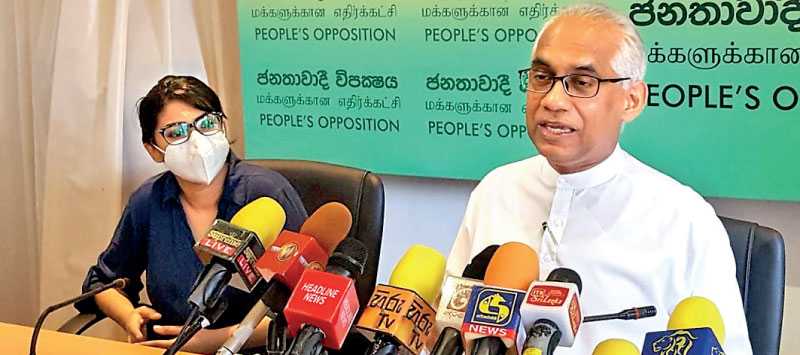Friday Feb 27, 2026
Friday Feb 27, 2026
Monday, 1 February 2021 02:28 - - {{hitsCtrl.values.hits}}

Samagi Jana Balawegaya MP Eran Wickremaratne and former MP Hirunika Premachandra addressing the press yesterday
By Asiri Fernando
The Executive branch of Government attempting to take over the functions of the Judiciary indirectly through commissions are a dangerous trend, Samagi Jana Balawegaya (SJB) Parliamentarian Eran Wickramaratne charged yesterday, stating that the main Opposition party objects vehemently to moves by the Government to appoint another new Presidential Commission of Inquiry (PCoI) to implement the recommendations of the pervious PCoI on political victimisation.
MP Wickramaratne raised concerns about the move at a press conference held yesterday at the Opposition leader’s office. Former SJB Parliamentarian Hirunika Premachandra joined him to address the press.
“The Executive is indirectly taking over judicial functions via these commissions. This is a dangerous trend. Changing the system of Government, whether it’s through gradual militarisation or the Executive taking over functions of the Judiciary is dangerous. We are a democracy. We are Asia’s oldest democracy... we will safeguard our democratic traditions and we will fight for it,” the Opposition MP stressed.
Wickramaratne argued that the three pillars of Government; the Executive, Legislative and Judiciary needs to be independent of each other, arguing that the processed used by the Government has been done in violation of the democratic norms of governance.
The Opposition’s protest comes in the wake of the President gazetting another PCoI; Special Presidential Commission of Inquiry to implement the recommendations and decisions made by the previous PCoI appointed to probe incidents of political victimisation.
The Gazette issued on 19 January empowers a three-member committee to looking in to the decisions and recommendations of the pervious PCI; ascertain if law enforcement units such as the Financial Crimes Investigation Division (FCID) established by the previous Government was established contrary to the provisions of the Code of Criminal Procedure and violating the provisions of the constitution, among others. The committee is expected to recommend pediments for those who have been named in relation to the inquiry.
Wickramaratne pointed out that the role of a presidential commission is truth-seeking and as such the members appointed perform an inquisitorial role, while in court a judge would be an impartial role and evaluate evidence presented by various parties.
“But we can see that in the concluded PCoI that the truth hasn’t really emerged. So, we are questioning what really has happened?” Wickramaratne charged, pointing out that many suspects who were taken before the courts have been release by the PCI report.
The Opposition MP highlighted that the PCoI report has alleged that a number of persons, many who are Opposition politicians and some senior law enforcement officers, have broken the law.
Responding to a question, Wickramaratne stated that PCoIs and specialised law enforcement units commissioned during the previous Government were truth finding mechanisms and not a court of law.
“The Executive and Legislature can have mechanisms to find out what happened, truth seeking mechanisms. However, they cannot punish anyone. Only a court of law can pass judgment and punish someone for a crime, within a democratic framework. An Executive cannot do that,” the Opposition MP argued.
“We object to this process. It is a politically motivated process. The problem in this country is not that it doesn’t have enough laws but that it lacks good leadership and management,” Wickramaratne opined.